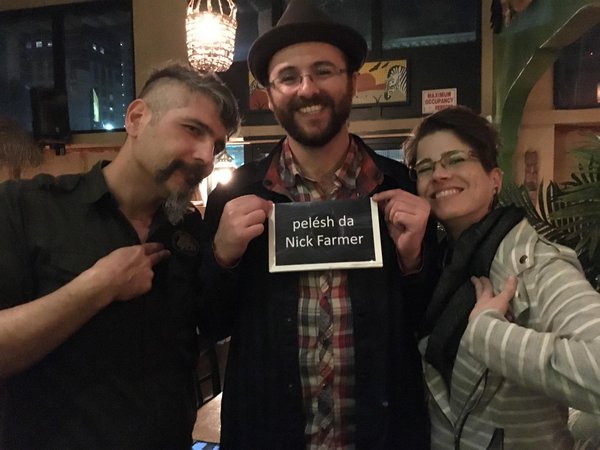OAKLAND, Calif.—It all started when Nick Farmer bought George R. R. Martin a drink, but the plot really thickened when the linguist met Martin's then-assistant Ty Franck. Franck was one half of the writing team behind the novels that fuel SyFy's incredible new series, The Expanse. And the author soon discovered that Farmer was a talented polyglot, a master of over two dozen languages who worked as a linguistic sellsword for financial research companies desperate to translate global business news for analysts. Farmer also happened to be just the kind of expert that Franck and his co-author Daniel Abraham needed to bring their novels to the screen.
The Expanse series takes place two centuries from now in the Belt, a ring of asteroids that orbit the Sun between Mars and Jupiter. People who have migrated to the Belt come from all over Earth speaking dozens of languages, and they're often isolated for years at a time on remote mining stations. To communicate, they evolve a creole called Belter, which becomes the lingua franca for what is essentially the solar system's new proletariat. The problem? In the book, Belter could be referenced. But now that The Expanse was coming to television, people would actually have to speak the damn thing. SyFy suddenly needed a linguist who could build a language out of dozens of parts. Luckily, Franck knew a guy. He soon recommended Farmer, who delivered a lot more than they bargained for.

Bullshit, but with less gravity
Farmer told us that he spent quite a while thinking about how a creole—usually a blend of a couple "substrate" languages and one dominant "superstrate"—would evolve in space. He used Haitian creole as his guide, because its speakers all came from elsewhere to work on the island. Slaves taken from Africa combined their own native languages with the dominant French, and the result was a shared tongue that only the slaves understood. Like Haiti, the Belt is dominated by a wealthy class of colonizers (in this case, Earthers who speak English). But all the labor is done by what Farmer calls "economic slaves" who risk their lives in mines. The resulting Belter creole is a crazy mix of English, Chinese, romance languages like French, German, Persian, Hebrew, Zulu, and a few other surprises. Farmer says he has over 1,000 Belter words in his personal dictionary, and he keeps adding more as the show's producers and fans request them.
There is a simple, regular grammar that is typical of creoles. If you're building a lingua franca, there's no point in filling it with Latin-style declensions and crazy irregular structures. But Farmer says there are complex levels when it comes to speaking Belter. Some characters speak pure Belter, but most speak about half-English, half-Belter, adjusting their vocabulary for each situation. If they're holding a separatist rally to protest Earther rule, Belter is the order of the day. If they're trying to talk to a boss, English makes more sense. In everyday chit-chat, they'll probably switch back and forth without thinking about it.
Farmer gave us the backstory on several of the words he's invented, including "well walla," a mix of English and Hindi. Well walla is a disparaging term for a Belter who acts like an Earther (well is for the "gravity well" of Earth, and walla means person in Hindi). He also decided that Belters wouldn't use the term "bullshit," because there would be no bulls in the Belt. Instead, they would come up with a uniquely Belter curse, "kaka felota," a term for what happens when your toilet backs up in low gravity and shit floats all over the place. ("Kata felota" literally means "floating shit.")At the event on Wednesday, Farmer regaled the Oakland crowd with a discussion of the Belter gestures. While they aren't part of the spoken language, they do form a crucial element of Belter culture—they're sort of like shrugs or handshakes, which aren't exactly words but do mean something. Like the spoken elements, Belter gestures are included without translation in the show.
One gesture Farmer's added to the show comes from Colombian culture—an elbow pointed down with the other hand rubbing the elbow joint. Like its Earther origin, it means someone who is a cheapskate. But over time in the Belt, the gesture has come to mean any person who is generally awful.
The Expanse has already finished its first season (we liked it as much as Farmer's fans at Longitude last week), but don't fret if you missed all the Belter thus far. SyFy has already greenlit a second season set to debut in 2017, meaning Farmer will have more additions to make to his dictionary. In the meantime, start studying with this bunch of #WowtLangBeltafoTudiye (Words of the Day).
Listing image by SyFy
reader comments
88